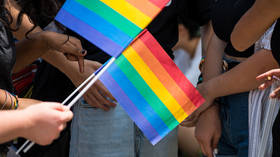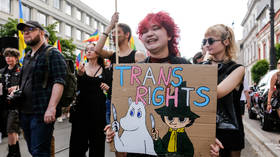Russian deputy minister slams ‘gay nationalism’

The ‘LGBT movement’ is based on a “destructive ideology” that poses a threat to Russia’s culture and population, and could eventually spark a gender war, Russian Deputy Justice Minister Oleg Sviridenko said at the St. Petersburg International Economic Forum (SPIEF) on Friday.
According to the official, the LGBT movement has long been used by “the Collective West” to target “basic moral and cultural norms, religious foundations, as well as the institution of marriage and family” in Russia.
Sviridenko was commenting on the decision in 2023 to ban the movement in the country. According to the official, his ministry has long monitored the activities of people associated with the group, which he said had operated in Russia since 1984, “spreading the destructive ideology of dismantling traditional values of family and marriage and creating a threat to the demographic situation in the country.” The agencies associated with the movement received funding from NGOs and grants from countries such as the US, UK, the Netherlands, and Sweden, Sviridenko claimed.
Based on the evidence it collected, the Russian authorities eventually decided to ban the movement, as “the basis that unites international LGBT communities is an ideology that destroys the moral foundations of Russian society,” Sviridenko stated.
“Representatives of the LGBT community… are easily involved in extremist activities and become carriers of corresponding ideological schemes and varieties of extremist manifestations... in the form of gender extremism and gay nationalism. [Their] actions contain calls for an all-out gender war,” he added, stressing that the legislation is Russia’s “institutional way” of protecting family values.
Russia has been tightening its laws regarding the LGBT movement since the early 2010s, first banning its propaganda among minors and then expanding the prohibition to adults in 2022. In July last year, the government also prohibited gender reassignment for people of all ages except for cases in which medical intervention is needed to treat birth abnormalities.
In November, the Russian Supreme Court designated the “international LGBT public movement” as an ‘extremist group’, banning its activities in the country.
These laws have drawn much criticism from Western officials and human rights groups. The Council of Europe commissioner for human rights, Dunja Mijatovic, has said that labeling the movement as extremist “violates basic human rights standards.” The European Court of Human Rights previously claimed that the law banning ‘LGBT propaganda’ is incompatible with the values of a democratic society.
Russian President Vladimir Putin said earlier this year that the authorities will not crack down on representatives of the LGBT community for their personal choices, explaining that the regulations only target those who “flaunt” them in public or involve children.













